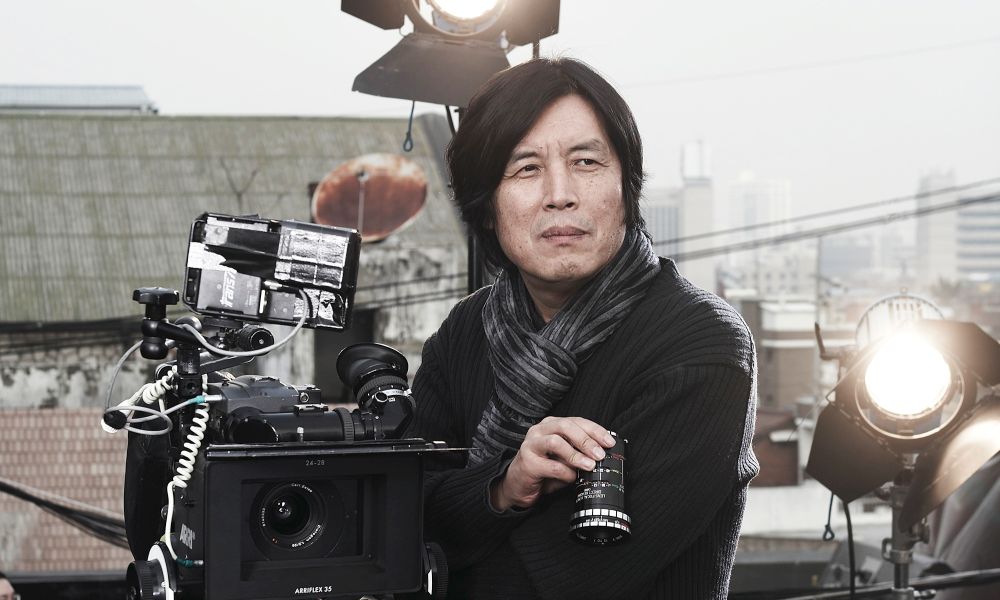"Lee Chang-dong has written and directed a mere six features in over 20 years, but these exquisite films have placed him among the most admired auteurs in cinema… A celebrated literary figure in South Korea whose fiction earned him accolades well before his foray into cinema, Lee writes and directs harrowing tales that place his characters in extreme psychological and physical agony to test the limits of the human spirit." - The Museum of Modern Art, 2019
Lee Chang-dong
Key Production Country: South Korea
Key Genres: Drama, Slice of Life, Crime Drama, Family Drama, Psychological Drama, Romantic Drama
Key Collaborators: Kim Hyun (Editor), Myeong Gye-nam (Producer), Shin Jum-hee (Production Designer), Park Myung-shin (Character Actress), Sol Kyung-gu (Leading Actor), Moon So-ri (Leading Actress), Ahn Nae-sang (Leading Actor), Mun Seong-kun (Leading Character Actor), Ko Seo-hie (Leading Character Actress), Lee Jae-jin (Composer)
Key Genres: Drama, Slice of Life, Crime Drama, Family Drama, Psychological Drama, Romantic Drama
Key Collaborators: Kim Hyun (Editor), Myeong Gye-nam (Producer), Shin Jum-hee (Production Designer), Park Myung-shin (Character Actress), Sol Kyung-gu (Leading Actor), Moon So-ri (Leading Actress), Ahn Nae-sang (Leading Actor), Mun Seong-kun (Leading Character Actor), Ko Seo-hie (Leading Character Actress), Lee Jae-jin (Composer)
"Lee began his working life as a high-school teacher, later becoming an accomplished novelist before transitioning to screenwriting and directing, as well as making a brief, improbable foray into government, serving as South Korea's Minister of Culture and Tourism from 2003 to 2004." - Patrick Brzeski (The Hollywood Reporter, 2018)
"Lee Chang-dong came to the cinema after a career writing fiction, wanting to reach a large audience with his work and believing this was no longer possible using the written word… Lee’s work is both distinctive among his Korean contemporaries, tending more toward realism in style even as he deals with the melodramatic plots required of mainstream cinema, while being more continuous with western art cinema humanism than cultish genre directors like Park Chan-wook and Bong Joon-ho or more minimalist stylists like Hong Sang-soo." - Marc Raymond (Oxford Bibliographies, 2020)

Secret Sunshine (2007)
"A celebrated academic and novelist prior to his directing career, Lee Chang-dong came to filmmaking relatively late in life, making his first feature in his forties. What unites all of his films is their extensive portraits of characters often at the mercy of circumstances beyond their control, be they societal and historical developments in his native South Korea, debilitating illnesses, or some omnipresent force that seems out to get them. As evidenced in his brilliant latest, Burning, Lee is unafraid to confront the ugliness of human nature." - Josh Slater-Williams (Little White Lies, 2019)
"Since making his feature debut, Green Fish, in 1997 at the age of forty-three (following a well-regarded career as a novelist), the great Korean director has exhibited a taste for darkness. In some of the most unrelentingly grim movies of the past few decades, he’s tackled such themes as his country’s oppressive recent history (Peppermint Candy), the sexual victimization of women (Oasis and Poetry), and the hopelessness that young people feel in an increasingly inscrutable world (Burning). Such ominous subject matter, combined with the level of perfectionism he brings to his art, gives each of his films the sense of having emerged out of a period of great struggle." - Andrew Chan (The Criterion Collection, 2019)
"He studied Korean literature at Kyungpuk National University, where he directed and acted in numerous plays. He graduated in 1980 and published his first novel, Chonri, in 1983. In the early '90s, he co-wrote, with director Park Kwang-su, two pivotal films of the Korean New Wave: To the Starry Island (1993) and A Single Spark (1996). Now an established figure in the Korean cinema community, Lee was encouraged by his colleagues to become a director (they even formed a mock committee dedicated to the cause.)" - Tom Vick (Allmovie)
Selected Filmography
{{row.titlelong}}
GF Greatest Films ranking (★ Top 1000 ● Top 2500)
21C 21st Century ranking (☆ Top 1000)
T TSPDT R Jonathan Rosenbaum
21C 21st Century ranking (☆ Top 1000)
T TSPDT R Jonathan Rosenbaum
Lee Chang-dong / Fan Club
Hirokazu Koreeda, Sean Baker, Firat Yücel, Peter Debruge, Kazuhiro Soda, Miwa Nishikawa, Ken Terawaki, Michel Ciment, Justin Chang, Jonathan Rosenbaum, Michael Atkinson, Kong Rithdee.
Hirokazu Koreeda, Sean Baker, Firat Yücel, Peter Debruge, Kazuhiro Soda, Miwa Nishikawa, Ken Terawaki, Michel Ciment, Justin Chang, Jonathan Rosenbaum, Michael Atkinson, Kong Rithdee.
"Fan Club"
These film critics/filmmakers have, on multiple occasions, selected this director’s work within film ballots/lists that they have submitted.
These film critics/filmmakers have, on multiple occasions, selected this director’s work within film ballots/lists that they have submitted.


